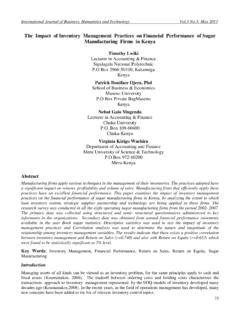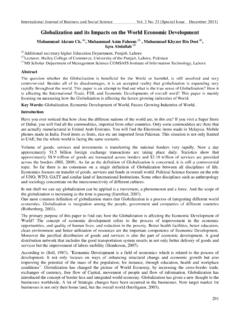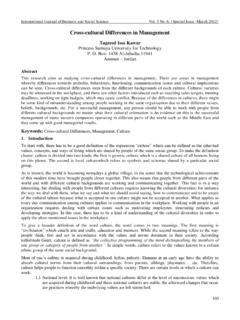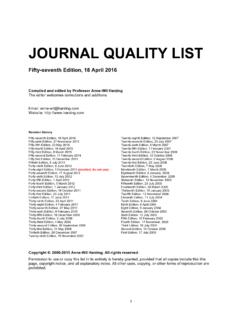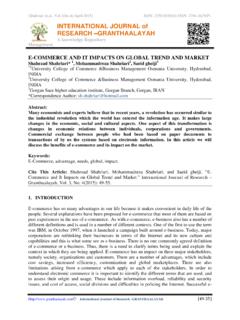Transcription of International Journal of Business Science and …
1 Internatioal Journal of nBusiness Science and applied ManagementVolume 6 - Issue ISSN 1753-0296A fresh approach to Business and management researchInt. Journal of Business Science and applied management , Volume 6, Issue 3, 2011 A Perspective for Supply Chain management : Building a Conceptual Framework Luai E. Jraisat Faculty of Business and Finance, American University of Madaba (AUM), Jordan Box 2777, Amman 11821, Jordan Telephone: +962 6 55 48 230/32 Email: Abstract Supply chain relationships play a significant role in supply chain management to respond to dynamic export market changes. If the dyadic exporter-producer relationships are still weak, they impede the emergence of a high performance supply chain within an export market.
2 This paper develops a conceptual framework for understanding how exporter-producer relationships include not only the relationship system but also network and transaction systems; and thus introduces a more integrated way of looking at supply chain management based on information sharing as a key process between exporters and producers. To achieve this aim, supply chain relationships are reviewed from the perspectives of relationship marketing theory, network theory and transaction cost theory. Findings from previous research are discussed to provide a better understanding of how these relationships have evolved. A conceptual framework is built by offering a central proposition that specific dimensions of relationships, networks and transactions are the key antecedents of information sharing, which in turn influences export performance in supply chain management .
3 Keywords: supply chain management , marketing, exporter-producer relationship, information sharing Int. Journal of Business Science and applied management / 2 1 INTRODUCTION To date, there have been a number of studies that have tended to concentrate on the background and phenomena of supply chain management as well as the supply chain relationships. However, conceptually the management of supply chains is not particularly fully understood, and many authors have highlighted the necessity of clear concepts and conceptual frameworks on supply chain management ( Harland, 1996; Wilson, 1996; Croom et al.)
4 , 2000; Svensson, 2002; Williamson, 2008). Most of the discussions were about supply chain relationships, information and product flow, networks and transactions ( Anderson et al., 1994; Ritter 1999; Toften and Olsen, 2003; Parker et al., 2006; Hsu et al., 2008). Little research ( Harland, 1996; Croom et al, 2000) has claimed and confirmed that buyer-seller relationships, networks and transactions are highly related to supply chain management . Some studies ( Wilson, 1996; Moberg et al., 2002; Hsu et al., 2008) have suggested that information sharing is one of the most important aspects of supply chain management for better understanding of supply chain relationships and performance.
5 Nevertheless, the impact of relationship, network and transaction perspectives on supply chain management has not been examined in any depth. There has been a lack of conceptual and empirical research on information sharing, which limits the understanding of the dyadic Business relationship and there has been no theoretical framework analysing export supply chain relationships. Thus, this paper attempts to present a review of the existing approaches to supply chain management that is associated with Business involving export markets. This is with the purpose of identifying important issues and research gaps for further research and providing an initial conceptual framework.
6 To do so, this research identifies four perspectives: supply chain management ( Harland, 1996; Croom et al, 2000; Lambert and Cooper, 2000) relationship marketing theory ( Wilson, 1995; Veludo et al., 2004; Eiriz and Wilson, 2006), network theory ( Anderson et al., 1994; Lazzarini, 2001; Ritter, 2004) and transaction cost theory ( Riordan and Williamson, 1985; Williamson, 2008). Amongst these perspectives, the researcher argues that supply chain management is used as the main theoretical background and thus has an ability to accommodate the three other perspectives. The paper is structured as follows: the importance of supply chain management is explained, key theoretical perspectives (relationship, network, and transaction theories) and export performance in the literature are reviewed and propositions are formed; the methodology is illustrated, a discussion of the results follows; and the final section concludes.
7 2 SUPPLY CHAIN management Supply chain management can be defined as the management of upstream and downstream relationships with buyers and sellers in order to create value in the final market at less cost to the supply chain as a whole (Christopher, 1998). Most of the studies on supply chain management (Croom et al., 2000; Lazzarini, 2001; Svensoon, 2002) have concluded that the lack of a universal definition of supply chain management is in part due to the approach of different researchers in developing the concept of supply chains. Such a multidisciplinary origin is reflected in the lack of holistic conceptual frameworks for the development of a perspective on supply chain management (Harland, 1996; Leonidou et al.)
8 , 2006). As a consequence, the schemes of interpretation of supply chain management are mostly partial with relatively poor findings that empirically validate the framework explaining the key themes and form of supply chain management , its buyer-seller relationships and its information sharing. The academic literature underlines a more varied rationale as several studies link supply chain management to key perspectives such as relationship marketing theory ( Wilson, 1995; Veludo et al., 2004; Eiriz and Wilson, 2006), network theory ( Anderson et al., 1994; Lazzarini, 2001; Ritter, 2004), and transaction cost theory ( Riordan and Williamson, 1985; Williamson, 2008).
9 The literature suggests that the concept of supply chain management brings different focuses ( Harland, 1996; Croom et al, 2000; Lazzarini, 2001; Eiriz and Wilson, 2006). For example, researchers may think of the relationship framework, which is built based on the dyadic relationship as the main unit to manage the flow of products and information. Others may link Business relationships to networks. This issue refers to the set of relationships where a single relationship cannot work alone without connecting with other relationships. Another important notion is the focus on the transactions of the relationship that are grouped in one supply chain.
10 Wilson (1996) argues that information sharing is one of the important aspects of supply chains for increasing profits and reducing costs, and must be investigated in more detail. Consequently, there is a demand for building a strong buyer-seller relationship to encourage the improvement of modern chains (Duffy et al., 2008). Supply chain management framework has become an important approach within management in developed countries since the 1990s. In the mid-1980s, transactions depended on arms-length agreements, whereas agreements in chain relationships were built on cooperation and information sharing in the 1990s (Hoyt and Huq, 2000).


